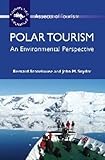Polar Tourism : An Environmental Perspective / Bernard Stonehouse, John Snyder.
Material type: TextSeries: Aspects of Tourism ; 43Publisher: Bristol, UK; Blue Ridge Summit, PA : Channel View Publications, [2010]Copyright date: ©2010Description: 1 online resource (232 p.)Content type:
TextSeries: Aspects of Tourism ; 43Publisher: Bristol, UK; Blue Ridge Summit, PA : Channel View Publications, [2010]Copyright date: ©2010Description: 1 online resource (232 p.)Content type: - 9781845411466
- 9781845411473
- Tourism -- Environmental aspects -- Polar regions
- Tourism -- Polar regions
- Polar regions
- THE ENVIRONMENT
- Tourism industry
- BUSINESS & ECONOMICS / Industries / Hospitality, Travel & Tourism
- Antarctica tourism
- Arctic tourism
- environmental heritage
- environmental management
- indigenous heritage
- polar regions
- polar tourism management
- polar tourism
- sensitive wilderness areas
- wilderness tourism
- 910.911
- G155.P65 S76 2010
- G155.P65
- online - DeGruyter
- Issued also in print.
| Item type | Current library | Call number | URL | Status | Notes | Barcode | |
|---|---|---|---|---|---|---|---|
 eBook
eBook
|
Biblioteca "Angelicum" Pont. Univ. S.Tommaso d'Aquino Nuvola online | online - DeGruyter (Browse shelf(Opens below)) | Online access | Not for loan (Accesso limitato) | Accesso per gli utenti autorizzati / Access for authorized users | (dgr)9781845411473 |
Frontmatter -- Contents -- Authors' Introduction -- Chapter 1. Arctic and Antarctic: Polar Regions and Environments -- Chapter 2. Arctic Tourism: History and Development -- Chapter 3. Antarctic Tourism: History and Development -- Chapter 4. Tourism in Changing Polar Environments -- Chapter 5. Wilderness Tourism: Challenges and Techniques -- Chapter 6. Managing Shipborne Tourism -- Chapter 7. Polar Culture and Heritage Tourism -- Chapter 8. Southern Oceans and Antarctic Tourism -- Chapter 9. Managing Polar Tourism: A Way Forward -- Appendix A -- Appendix B: World Heritage Sites and National Parks in Polar Regions -- Appendix C: Maritime Conventions -- Appendix D: Best-Practice Guidelines for Polar Visitors and Tour Operators -- Appendix E: Provisions of the Antarctic Treaty -- Appendix F -- References
restricted access online access with authorization star
http://purl.org/coar/access_right/c_16ec
Tourism throughout the world raises environmental issues that are often concerned with conflicting rights and responsibilities: the inherent right of mankind to travel, the no-less inherent right of indigenous people to guard their environmental heritage, and the responsibility of governments - local, national or (in the unique case of Antarctica) international - to protect environments over which they exercise stewardship. Additionally, the presence of international commercial enterprises, especially marine and other mass transport modes, represent unique governance challenges.This book deals mainly with environmental issues and the management implications arising from polar tourism, one of the fastest-growing sectors of world tourism. However, many of the issues discussed here arise no less urgently in temperate and tropical wilderness areas, and indeed in any region where sensitive environments are subjected to mass tourism. The principles and guidelines discussed here are of interest and practical use in tourism studies generally.
Issued also in print.
Mode of access: Internet via World Wide Web.
In English.
Description based on online resource; title from PDF title page (publisher's Web site, viewed 30. Aug 2021)


